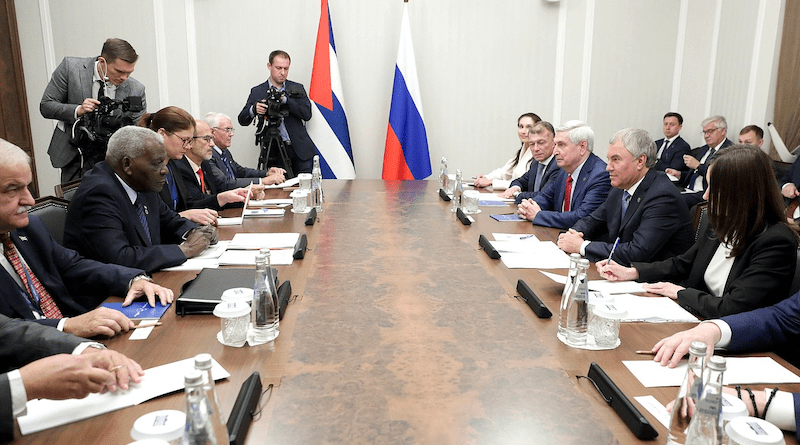Latin American Legislators Expect An Increasing Multifaceted Cooperation With Russia – OpEd
Russia has intensified serious efforts in strengthening relations in various directions including parliaments primarily due to the rapidly changing global political situation. While post-Soviet focus was initially on Europe and the United States, now that has shifted to Latin America, Asia and Africa. But Russia itself largely as Eurasian country still slow in opening up for frequent interactions with foreigners from the Global South.
During the past few years, interactions have been limited to conferences and summits. In March 2023 for instance, Russia held the second inter-parliamentary conference ‘Russia-Africa’ and that was followed by a summit late July. Now late September was the turn of Latin America.
On September 29 – October 2, the first international Parliamentary Conference ‘Russia – Latin America’ was held in Moscow at the initiative of the State Duma. More than 200 participants, including parliamentarians from different countries of Latin America and the Caribbean attended. Russian and her colleagues from Latin America and the Caribbean discussed several topics of common interest relating the changing geopolitics, inter-parliamentary diplomacy, economic architecture, and social and culture aspects of life.
Russian President Vladimir Putin spoke at the opening session on September 29, emphasized the fact that the presence of high-ranking legislators from Latin America and the Caribbean re-affirmed the desire and willingness to develop a comprehensive beneficial partnership with Russia. “We are convinced that promoting direct dialogue between parliaments will open up opportunities for deepening our cooperation and expanding it through new areas of joint activity,” he told the gathering of parliamentarians.
Today with the changes taking place around the world, Latin American countries are showing a pattern in the political approach to may significant issues in the process of support to the formation of a multipolar system. In order to achieve this and their individual national goals, parliaments are expected to play its part. Apparently, the role of parliamentary diplomacy in strengthening cooperation between Russia and Latin American countries, and there is really nothing new, as it known to cut most notably across the board: in politics and security, as well as socioeconomic and humanitarian spheres.
In Latin American region, Russia has a few economic footprints, and there are possibilities to expand new business, engage in scientific and cultural exchanges and increase tourism in both directions. It currently has a nuclear research and technology centre is being built in Bolivia, that joint biopharmaceutical enterprises are expanding their activities in Nicaragua and Venezuela, and that a metallurgical plant is being upgraded in Cuba.
In his speech, Putin also pointed to Russian-Latin American projects in medicine and public health, and biological and epidemiological security are being implemented with good results. During the coronavirus pandemic, Russia was among the first to supply Latin America with large shipments of vaccines, test systems, sanitary and hygiene products, and other medical and humanitarian goods.
Statistics show that nearly half a million Russian have fully integrated into the society in Latin American region, compared Latinos in the Russian Federation. It explicitly points to the extent how closed has become Russian society, especially being vocal on multipolarism. Simply, both inbound and outbound tourism are down, despite Russia claims to have established visa-free travel system which currently includes 27 Latin American countries.
Chairman of the State Duma, Vyacheslav Volodin, noted the contribution to the development of relations between Russia and Venezuela made by the Presidents Vladimir Putin and Nicolás Maduro. The task of the parliaments is to reach an absolutely new level of dialogue, to provide legislative support for the implementation of the agreements reached by the heads of states, according to Vyacheslav Volodin.
“We have great opportunities to make our own contribution to the development of relations between our states, our nations. Venezuela and Russia are connected not only by ties of friendship and long-standing relations. We are counterparts and like-minded people, we stand for a multipolar world, building a just world order,” emphasized the Chairman of the State Duma.
“The world is not unipolar anymore. There is no more global policeman who told us what we should do and with whom we should cooperate. Just like you, we stand for a multipolar world – a world based on the principles of cooperation, respect, respect for the right to independence and sovereignty,” said Jorge Rodríguez Gómez.
“We are supporters of building a multipolar world, we stand for a just world order and believe that every country should have the opportunity to develop and plan its future,” emphasized Vyacheslav Volodin at the meeting with the President of the National Congress of the Republic of Honduras Luis Redondo Guifarro. And also with Brazilian Veneziano Vital do Rêgo Segundo Neto.
Vyacheslav Volodin held special bilateral meeting the President of the National Assembly of People’s Power and the Council of State of Cuba Juan Esteban Lazo Hernández. Volodin recalled the first meeting of the Commission on Cooperation between the State Duma and the National Assembly of People’s Power of Cuba was held in Havana in April. Among the priority areas of joint projects between Russia and Cuba, included the extraction and processing of mineral resources, the production of cane sugar, tourism, and solar energy, humanitarian and education cooperation.
The development of parliamentarism has become one of the platforms to further in-depth discussions on a number of issues facing Russia in the changing world. Latin American parliamentarians gathered here for a four-day international forum (September 29 to October 2) at the initiative of the State Duma, the lower house of the Federal Assembly of Russian Federation.

